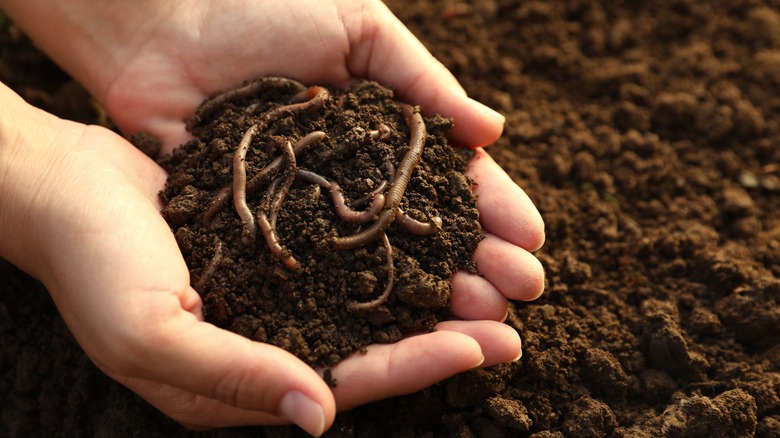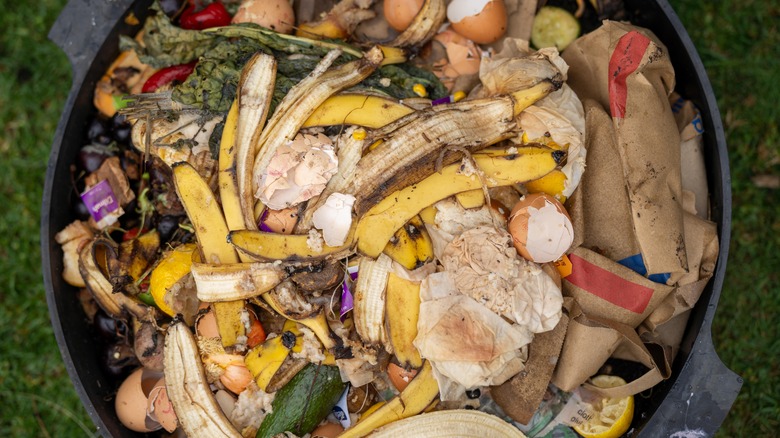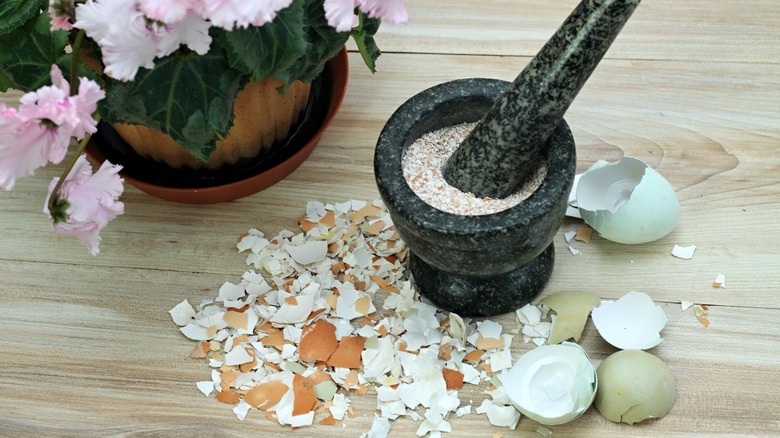Here's What You Should Be Feeding Worms For Healthy Garden Compost
Using worms to make compost is known as vermicomposting and is a great way to turn your kitchen scraps into nutrient-rich fertilizer for your garden. If you haven't tried this yet, you might want to learn how to start worm composting in your kitchen. By recycling your organic waste and turning it into compost, you're keeping it out of landfill and helping the environment. Worms are voracious eaters and can consume about half their weight on a daily basis. The worms will easily devour all your vegetable and fruit scraps including peels and apple cores.
Feeding your worms vegetative scraps from the kitchen will keep them happy but like any other type of compost, don't forget to add some "brown" materials such as dry leaves and shredded paper. You also want to add some form of "grit" like crushed eggshells, rock dust, or even garden soil. As the worms work their way through your kitchen scraps, they'll produce worm castings which are a powerhouse of nutrition that the plants in your garden will love. You can also soak the castings that you've collected in water to make "worm tea". This makes the perfect liquid fertilizer for your houseplants and can also be used on the plants in your garden.
What to feed your worms to keep them happy
You can feed your worms most fruit and vegetable scraps from the kitchen but avoid citrus fruits, hot peppers, onion, and garlic. Worms will feed happily on things like banana skins, watermelon rinds, apple cores, lettuce scraps, kale, melons, pumpkins, and cantaloupe. You can also add small amounts of used coffee grounds and tea leaves but make sure that they're cooled first. In fact, tea leaves are considered the secret ingredient that'll make your compost richer than ever and the worms will love them. Plus, these leaves and used coffee grounds are particularly beneficial because they'll add some moisture to your worm bin which is necessary for worm health. Your worm bin should always be moist but never overly wet because this will inhibit the oxygen flow, which is also necessary. It's a good idea to chop up any additions before adding them to the worm bin as this helps to speed up composting and makes it easier for the worms to feed on the scraps.
Whenever you add "green" materials like vegetable scraps, you want to cover these with a layer of "brown" items like shredded paper or cardboard. You can also use torn egg cartons, cereal boxes, toilet paper rolls, and dry leaves from the garden. These products not only add carbon for healthy compost but they also provide bedding for your worms. But don't use cardboard that has a waxy coating or glossy paper.
Gritty additions and materials to avoid
As worms don't have teeth, they need some form of grit to help break down the foods. According to the Oregon State University Extension worms process food with the muscles in their crop and gizzard but they need grit to help break down the food particles. This grit can consist of crushed oyster shells, garden soil, or even vermiculite. Crushed eggshells are particularly useful and adding them to your worm farm is a great way to use eggshells around your home and garden. Ideally, you want to add around half a cup of grit every two months.
Knowing what to feed your worms will keep them happy, but you also need to know what you should avoid. For example, don't ever add animal products such as meat or dairy. These may contain bacteria that can harm the worms. Also avoid products like bread, beans, and rice because these may ferment. This will reduce the amount of oxygen that the worms need, and can also cause unpleasant odors.
You shouldn't overfeed your worms either. Any food scraps that are not consumed rapidly will start to rot. This can cause fermentation and create unpleasant odors in your worm bin. As a general guide, if you have around 500 worms in your bin, you should only add around one to two quarts of food scraps per week.


